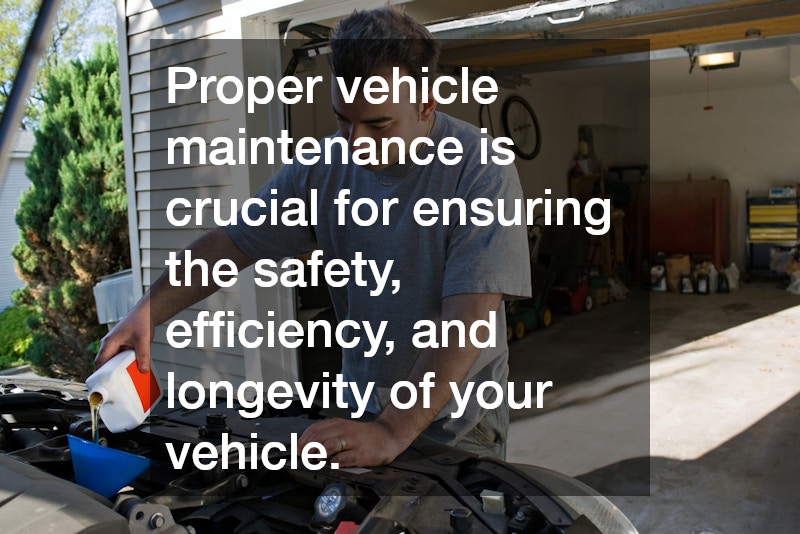Vehicle maintenance is essential for prolonging the life of your car and ensuring that it runs efficiently. However, many vehicle owners unknowingly make mistakes that can lead to costly repairs and reduce the lifespan of their vehicle. In this article, we will discuss some of the most common vehicle maintenance mistakes and offer practical solutions to avoid them. By understanding and avoiding these pitfalls, you can save time, money, and keep your vehicle running smoothly.
Whether you are a seasoned car expert or a novice driver, this information is crucial to keeping your car in top condition.
Skipping Regular Oil Changes
One of the most common and potentially damaging mistakes is skipping regular oil changes. Engine oil is the lifeblood of your vehicle, lubricating the engine’s components and preventing overheating. When oil changes are skipped, the oil becomes dirty and less effective, which can lead to increased engine wear and eventually catastrophic engine failure. It’s recommended that vehicle owners adhere to the manufacturer’s oil change schedule, typically every 3,000 to 5,000 miles, depending on the type of oil and driving conditions. By maintaining a regular oil change routine, you can greatly enhance the longevity and performance of your vehicle.
Failing to change the oil on time can also result in sludge buildup, which clogs the engine and reduces efficiency. Sludge can block oil passages, leading to expensive repairs and replacements. Furthermore, dirty oil can increase fuel consumption, adding to your overall vehicle costs. Regular oil changes provide an opportunity to check for leaks and other potential issues, ensuring your vehicle is in the best condition possible. Therefore, never underestimate the importance of timely oil maintenance in prolonging your vehicle’s life.
Another reason drivers skip oil changes is the misconception that all engine oils are the same, which is not true. Different vehicles require specific types of oil for optimal performance, and using the wrong type can harm your engine. Consultation with your vehicle’s manual or a trusted mechanic can provide guidance on the right oil for your vehicle. Additionally, synthetic oils may require less frequent changes, but it’s crucial to still follow the manufacturer’s recommendations. By being informed and diligent, you can avoid unnecessary vehicle wear and the mistakes that come with improper oil maintenance.
Ignoring Dashboard Warning Lights
Ignoring dashboard warning lights is another frequent mistake that can lead to significant problems if left unaddressed. These lights are not mere suggestions; they indicate that something needs your attention immediately. The “check engine” light, for example, could signal anything from a loose gas cap to serious engine issues. Ignoring these warnings can lead to more severe problems and costly repairs down the line. It’s essential to address these alerts as soon as possible to prevent minor issues from becoming major problems.
Often, vehicle owners dismiss warning lights due to a lack of understanding or fear of expensive repairs. However, many issues signaled by warning lights are relatively straightforward and affordable to fix if caught early. Technologies like the onboard diagnostics (OBD) system have made it easier to pinpoint the exact issue with the help of a diagnostic tool. By promptly responding to these alerts, you can save yourself from more significant repairs and ensure that your vehicle remains reliable and safe on the road.
Additionally, regular checks can identify sensor malfunctions, which may cause false alarms in the dashboard warning system. Ensuring these sensors are working correctly is a part of good vehicle maintenance practice that prevents unwarranted panic and stress. Routine maintenance checks by a professional can help clear doubts and ensure every part of the warning system is functioning correctly. Understanding the signals from your vehicle’s dashboard can be pivotal in preventing larger-scale problems, making it vital not to ignore these essential alerts.
Neglecting Tire Maintenance
Proper tire maintenance is often overlooked, yet it is crucial for vehicle safety and performance. Many drivers fail to check their tire pressure regularly, which can result in uneven wear, poor fuel efficiency, and increased risk of accidents. Under-inflated tires can overheat and are prone to blowouts, while over-inflated tires may wear unevenly and affect handling. It’s important to check tire pressure monthly and before long trips, following the vehicle manufacturer’s recommended PSI levels to ensure safety and longevity.
Another aspect of tire maintenance is ensuring proper tire alignment and rotation, which can prolong the lifespan of the tires and improve fuel efficiency. Misaligned tires can cause steering issues and uneven tire wear, leading to replacement sooner than necessary. Regular tire rotation, typically every 5,000 to 8,000 miles, ensures even wear and optimal performance. By paying attention to tire maintenance, drivers can enhance their vehicle’s performance and safety, while also saving on unnecessary costs.
Proper vehicle maintenance is crucial for ensuring the safety, efficiency, and longevity of your vehicle. By avoiding common mistakes such as skipping regular oil changes, ignoring dashboard warning lights, and neglecting tire maintenance, you can greatly enhance your vehicle’s performance and avoid costly repairs. Regular maintenance not only prolongs the life of your vehicle but also promotes safety on the road, protecting you, your passengers, and other drivers. Remember, staying informed and proactive about vehicle maintenance can prevent minor issues from escalating into major problems. By integrating these practices into your routine, you can enjoy a smoother, safer, and more cost-effective driving experience.




